Bass Sheet Music
 "Music, once admitted to the soul, becomes a sort of spirit, and never dies. " Edward George Bulwer-Lytton
"Music, once admitted to the soul, becomes a sort of spirit, and never dies. " Edward George Bulwer-Lytton
Randy Newman
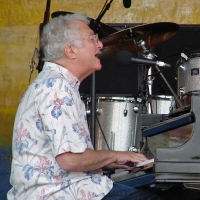
Randall Stuart “Randy” Newman (born November 28, 1943) is an American singer/songwriter, arranger, composer, and pianist who is notable for his mordant (and often satirical) pop songs and for his many film scores.
Newman is noted for his practice of writing lyrics from the perspective of a character far removed from Newman's own biography. For example, the 1972 song "Sail Away" is written as a slave trader's sales pitch to attract slaves, while the narrator of "Political Science" is a U.S. nationalist who complains of worldwide ingratitude toward America and proposes a brutally ironic final solution. One of his biggest hits, "Short People" was written from the perspective of "a lunatic" who hates short people. Since the 1980s, Newman has worked mostly as a film composer. His film scores include Ragtime, Awakenings, The Natural, Leatherheads, James and the Giant Peach, Meet the Parents and Seabiscuit. He has scored five Disney-Pixar films: Toy Story, A Bug's Life, Toy Story 2, Monsters, Inc. and Cars. Most recently he scored Princess and the Frog and is set to return for Toy Story 3 and Cars 2.
He has been singled out for a number of awards by his colleagues, including an Academy Award, two Emmy Awards, four Grammy Awards, and the Governor's Award from the Recording Academy. Randy Newman was inducted into the Songwriters Hall of Fame in 2002. In 2007, Newman was inducted as a Disney Legend.
Newman is noted for his practice of writing lyrics from the perspective of a character far removed from Newman's own biography. For example, the 1972 song "Sail Away" is written as a slave trader's sales pitch to attract slaves, while the narrator of "Political Science" is a U.S. nationalist who complains of worldwide ingratitude toward America and proposes a brutally ironic final solution. One of his biggest hits, "Short People" was written from the perspective of "a lunatic" who hates short people. Since the 1980s, Newman has worked mostly as a film composer. His film scores include Ragtime, Awakenings, The Natural, Leatherheads, James and the Giant Peach, Meet the Parents and Seabiscuit. He has scored five Disney-Pixar films: Toy Story, A Bug's Life, Toy Story 2, Monsters, Inc. and Cars. Most recently he scored Princess and the Frog and is set to return for Toy Story 3 and Cars 2.
He has been singled out for a number of awards by his colleagues, including an Academy Award, two Emmy Awards, four Grammy Awards, and the Governor's Award from the Recording Academy. Randy Newman was inducted into the Songwriters Hall of Fame in 2002. In 2007, Newman was inducted as a Disney Legend.
Jimi Hendrix
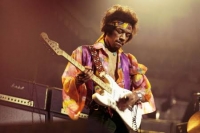
Johnny Allen "Jimi" Hendrix, American guitarist, guitar virtuoso, singer, songwriter and cultural icon. Hendrix is one of the most influential musicians in rock history. Hendrix, who first gained fame in the UK, became world famous after the Monterey Pop Festival in 1967
Avenue Q
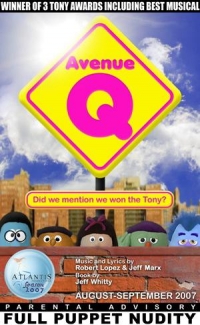
Avenue Q is a musical conceived by Robert Lopez and Jeff Marx, who wrote the music and lyrics, and directed by Jason Moore. The book is by Jeff Whitty. The show was produced by and opened at the Off-Broadway Vineyard Theatre in March 2003. The production transferred to Broadway in July 2003 and won several Tony Awards, including the award for Best Musical. It is still running on Broadway and holds the position of 26th longest running musical in Broadway history. The show has spawned a 2005 Las Vegas production, a 2006 West End production and various international productions. A U.S. national tour began in July 2007.
The show is largely inspired by (and is in the style of) Sesame Street: Most of the characters in the show are puppets (operated by actors onstage), the set depicts several tenements on a rundown street in an "outer borough" of New York City, both the live characters and puppet characters sing, and short animated video clips are played as part of the story. Also, several characters are recognizably parodies of classic Sesame Street characters: for example, the roommates Rod and Nicky are versions of Sesame Street's Bert and Ernie, and Trekkie Monster is based on Cookie Monster. However, the characters are in their twenties and thirties and face adult problems instead of those faced by pre-schoolers, thus making the show more suited for the adults who grew up with Sesame Street. The characters use profanity, and the songs concern adult themes (except the opening number). A recurring theme is the central character's search for a "purpose." Since the musical soundtrack for it was released, the song "The Internet is For Porn" has become particularly popular on websites such as YouTube and can be downloaded for free from the official website. According to the official site, the musical is appropriate for both adults and teenagers.
The show is largely inspired by (and is in the style of) Sesame Street: Most of the characters in the show are puppets (operated by actors onstage), the set depicts several tenements on a rundown street in an "outer borough" of New York City, both the live characters and puppet characters sing, and short animated video clips are played as part of the story. Also, several characters are recognizably parodies of classic Sesame Street characters: for example, the roommates Rod and Nicky are versions of Sesame Street's Bert and Ernie, and Trekkie Monster is based on Cookie Monster. However, the characters are in their twenties and thirties and face adult problems instead of those faced by pre-schoolers, thus making the show more suited for the adults who grew up with Sesame Street. The characters use profanity, and the songs concern adult themes (except the opening number). A recurring theme is the central character's search for a "purpose." Since the musical soundtrack for it was released, the song "The Internet is For Porn" has become particularly popular on websites such as YouTube and can be downloaded for free from the official website. According to the official site, the musical is appropriate for both adults and teenagers.
Chaka Khan
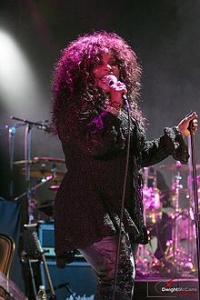
Chaka Khan (born Yvette Marie Stevens; March 23, 1953) is an American singer and composer who gained fame in the 1970s as the frontwoman and focal point of the funk band Rufus. While still a member of the group in 1978, Khan embarked on a successful solo career. Her signature hits, both with Rufus and as a solo performer, include "Tell Me Something Good", "Sweet Thing", "Ain't Nobody", "I'm Every Woman", "I Feel for You" and "Through the Fire".
Miles Davis

Miles Dewey Davis III (May 26, 1926 – September 28, 1991) was an American trumpeter, bandleader, and composer.
Widely considered one of the most influential musicians of the 20th century, Miles Davis was, with his musical groups, at the forefront of several major developments in jazz music, including bebop, cool jazz, hard bop, modal jazz, and jazz fusion. Many well-known musicians rose to prominence as members of Davis' ensembles, including saxophonists Gerry Mulligan, John Coltrane, Cannonball Adderley, George Coleman, Wayne Shorter, Dave Liebman, Branford Marsalis and Kenny Garrett; trombonist J. J. Johnson; pianists Horace Silver, Red Garland, Wynton Kelly, Bill Evans, Herbie Hancock, Joe Zawinul, Chick Corea, and Keith Jarrett; guitarists John McLaughlin, Pete Cosey, John Scofield and Mike Stern; bassists Paul Chambers, Ron Carter, Dave Holland, Marcus Miller and Darryl Jones ; and drummers Philly Joe Jones, Jimmy Cobb, Tony Williams, Billy Cobham, Jack DeJohnette, and Al Foster.
On October 7, 2008, his album Kind of Blue, released in 1959, received its fourth platinum certification from the RIAA, signifying sales of 4 million copies. Miles Davis was inducted into the Rock and Roll Hall of Fame in 2006. Davis was noted as "one of the key figures in the history of jazz".
On November 5, 2009, Rep. John Conyers of Michigan sponsored a measure in the US House of Representatives to recognize and commemorate the album Kind of Blue on its 50th anniversary. The measure also affirms jazz as a national treasure and "encourages the United States government to preserve and advance the art form of jazz music." It passed, unanimously, with a vote of 409–0 on December 15, 2009.
Widely considered one of the most influential musicians of the 20th century, Miles Davis was, with his musical groups, at the forefront of several major developments in jazz music, including bebop, cool jazz, hard bop, modal jazz, and jazz fusion. Many well-known musicians rose to prominence as members of Davis' ensembles, including saxophonists Gerry Mulligan, John Coltrane, Cannonball Adderley, George Coleman, Wayne Shorter, Dave Liebman, Branford Marsalis and Kenny Garrett; trombonist J. J. Johnson; pianists Horace Silver, Red Garland, Wynton Kelly, Bill Evans, Herbie Hancock, Joe Zawinul, Chick Corea, and Keith Jarrett; guitarists John McLaughlin, Pete Cosey, John Scofield and Mike Stern; bassists Paul Chambers, Ron Carter, Dave Holland, Marcus Miller and Darryl Jones ; and drummers Philly Joe Jones, Jimmy Cobb, Tony Williams, Billy Cobham, Jack DeJohnette, and Al Foster.
On October 7, 2008, his album Kind of Blue, released in 1959, received its fourth platinum certification from the RIAA, signifying sales of 4 million copies. Miles Davis was inducted into the Rock and Roll Hall of Fame in 2006. Davis was noted as "one of the key figures in the history of jazz".
On November 5, 2009, Rep. John Conyers of Michigan sponsored a measure in the US House of Representatives to recognize and commemorate the album Kind of Blue on its 50th anniversary. The measure also affirms jazz as a national treasure and "encourages the United States government to preserve and advance the art form of jazz music." It passed, unanimously, with a vote of 409–0 on December 15, 2009.
Handel

George Frideric Handel (Friday, 23 February 1685 - Saturday, 14 April 1759) was a German-born Baroque composer who is famous for his operas, oratorios and concerti grossi. Born as Georg Friedrich Handel in Halle, he spent most of his adult life in England, becoming a subject of the British crown on 22 January 1727. His most famous works are Messiah, an oratorio set to texts from the King James Bible; Water Music; and Music for the Royal Fireworks. Strongly influenced by the techniques of the great composers of the Italian Baroque and the English composer Henry Purcell, his music was known to many significant composers who came after him, including Haydn, Mozart, and Beethoven.
Handel's compositions include 42 operas; 29 oratorios; more than 120 cantatas, trios and duets; numerous arias; chamber music; a large number of ecumenical pieces; odes and serenatas; and sixteen organ concerti. His most famous work, the Messiah oratorio with its "Hallelujah" chorus, is among the most popular works in choral music and has become a centerpiece of the Christmas season. Also popular are the Opus 3 and 6 Concerti Grossi, as well as "The Cuckoo and the Nightingale", in which birds are heard calling during passages played in different keys representing the vocal ranges of two birds. Also notable are his sixteen keyboard suites, especially The Harmonious Blacksmith.
Handel introduced various previously uncommon musical instruments in his works: the viola d'amore and violetta marina (Orlando), the lute (Ode for St. Cecilia's Day), three trombones (Saul), clarinets or small high cornets (Tamerlano), theorbo, French horn (Water Music), lyrichord, double bassoon, viola da gamba, bell chimes, positive organ, and harp (Giulio Cesare, Alexander's Feast).
Handel's compositions include 42 operas; 29 oratorios; more than 120 cantatas, trios and duets; numerous arias; chamber music; a large number of ecumenical pieces; odes and serenatas; and sixteen organ concerti. His most famous work, the Messiah oratorio with its "Hallelujah" chorus, is among the most popular works in choral music and has become a centerpiece of the Christmas season. Also popular are the Opus 3 and 6 Concerti Grossi, as well as "The Cuckoo and the Nightingale", in which birds are heard calling during passages played in different keys representing the vocal ranges of two birds. Also notable are his sixteen keyboard suites, especially The Harmonious Blacksmith.
Handel introduced various previously uncommon musical instruments in his works: the viola d'amore and violetta marina (Orlando), the lute (Ode for St. Cecilia's Day), three trombones (Saul), clarinets or small high cornets (Tamerlano), theorbo, French horn (Water Music), lyrichord, double bassoon, viola da gamba, bell chimes, positive organ, and harp (Giulio Cesare, Alexander's Feast).
Lee Morgan

Lee Morgan (July 10, 1938 – February 19, 1972) was an American jazz trumpeter and composer.
One of the key hard bop musicians of the 1960s, Morgan came to prominence in his late teens, recording on John Coltrane's Blue Train (1957) and with the band of drummer Art Blakey before launching a solo career. Morgan stayed with Blakey until 1961 and started to record as leader soon after. His song "The Sidewinder", on the album of the same name, became a surprise crossover hit on the pop and R&B charts in 1964, while Morgan's recordings found him touching on other styles of music as his artistry matured. Soon after The Sidewinder was released, Morgan rejoined Blakey for a short period. After leaving Blakey for the final time, Morgan continued to work prolifically as both a leader and a sideman with the likes of Hank Mobley and Wayne Shorter, becoming a cornerstone of the Blue Note label.
One of the key hard bop musicians of the 1960s, Morgan came to prominence in his late teens, recording on John Coltrane's Blue Train (1957) and with the band of drummer Art Blakey before launching a solo career. Morgan stayed with Blakey until 1961 and started to record as leader soon after. His song "The Sidewinder", on the album of the same name, became a surprise crossover hit on the pop and R&B charts in 1964, while Morgan's recordings found him touching on other styles of music as his artistry matured. Soon after The Sidewinder was released, Morgan rejoined Blakey for a short period. After leaving Blakey for the final time, Morgan continued to work prolifically as both a leader and a sideman with the likes of Hank Mobley and Wayne Shorter, becoming a cornerstone of the Blue Note label.
Pulp Fiction
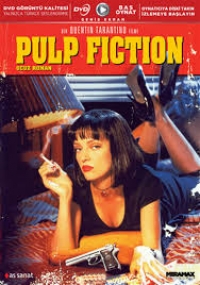
Pulp Fiction is a 1994 American neo-noir black comedy crime film written and directed by Quentin Tarantino, who conceived it with Roger Avary. Starring John Travolta, Samuel L. Jackson, Bruce Willis, Tim Roth, Ving Rhames, and Uma Thurman, it tells several stories of criminal Los Angeles. The title refers to the pulp magazines and hardboiled crime novels popular during the mid-20th century, known for their graphic violence and punchy dialogue.
Brian Culbertson

Brian Culbertson (born January 12, 1973) is an American smooth jazz/R&B/funk musician, instrumentalist, producer and performer from Decatur, Illinois, United States. His instruments include the synthesizer, piano and trombone.
Steve Swallow
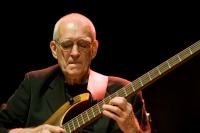
Steve Swallow (born October 4, 1940) is a jazz fusion bassist and composer noted for his collaborations with Jimmy Giuffre, Gary Burton, and Carla Bley. He was one of the first jazz double bassists to switch entirely to electric bass guitar.
Joe Cocker
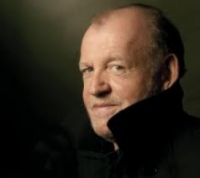
John Robert "Joe" Cocker, OBE (born 20 May 1944) is an English rock/blues musician, composer and actor who came to popularity in the 1960s, and is most known for his gritty voice, his idiosyncratic arm movements while performing, and his cover versions of popular songs, particularly those of The Beatles. He is the recipient of several awards, including a 1983 Grammy Award for his song "Up Where We Belong", a duet which he performed with Jennifer Warnes. He was ranked #97 on Rolling Stone's 100 greatest singers list.
Evanescence

Evanescence is an American rock band founded in Little Rock, Arkansas in 1995 by singer/pianist Amy Lee and guitarist Ben Moody.
After recording two private EPs and a demo CD named Origin, with the help of Bigwig Enterprises in 2000, the band released their first full-length album, Fallen, on Wind-up Records in 2003. Fallen sold more than 15 million copies worldwide and helped the band win two Grammy Awards. A year later, Evanescence released their first live album, Anywhere but Home, which sold more than one million copies worldwide. In 2006, the band released their second studio album, The Open Door, which has sold more than four million copies.
The band has suffered several line-up changes, including co-founder Moody leaving in 2003, followed by guitarist John LeCompt and drummer Rocky Gray in 2007. Lee is now the only original member of Evanescence remaining in the band.
After recording two private EPs and a demo CD named Origin, with the help of Bigwig Enterprises in 2000, the band released their first full-length album, Fallen, on Wind-up Records in 2003. Fallen sold more than 15 million copies worldwide and helped the band win two Grammy Awards. A year later, Evanescence released their first live album, Anywhere but Home, which sold more than one million copies worldwide. In 2006, the band released their second studio album, The Open Door, which has sold more than four million copies.
The band has suffered several line-up changes, including co-founder Moody leaving in 2003, followed by guitarist John LeCompt and drummer Rocky Gray in 2007. Lee is now the only original member of Evanescence remaining in the band.
Hiromi

Hiromi Uehara, known professionally as Hiromi, is a jazz composer and pianist born in Hamamatsu, Japan. She is known for her virtuosic technique, energetic live performances and blend of musical genres such as stride, post-bop, progressive rock, classical and fusion in her compositions.
Charles Mingus
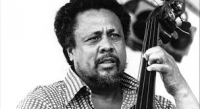
Charles Mingus Jr. (April 22, 1922 – January 5, 1979) was an American jazz double bassist, pianist, composer and bandleader. A major proponent of collective improvisation, he is considered to be one of the greatest jazz musicians and composers in history, with a career spanning three decades and collaborations with other jazz legends such as Louis Armstrong, Duke Ellington, Charlie Parker, Dizzy Gillespie, Dannie Richmond, and Herbie Hancock.
Mingus' compositions continue to be played by contemporary musicians ranging from the repertory bands Mingus Big Band, Mingus Dynasty, and Mingus Orchestra, to the high school students who play the charts and compete in the Charles Mingus High School Competition. In 1993, the Library of Congress acquired Mingus's collected papers—including scores, sound recordings, correspondence and photos—in what they described as "the most important acquisition of a manuscript collection relating to jazz in the Library's history"
Mingus' compositions continue to be played by contemporary musicians ranging from the repertory bands Mingus Big Band, Mingus Dynasty, and Mingus Orchestra, to the high school students who play the charts and compete in the Charles Mingus High School Competition. In 1993, the Library of Congress acquired Mingus's collected papers—including scores, sound recordings, correspondence and photos—in what they described as "the most important acquisition of a manuscript collection relating to jazz in the Library's history"
Stevie Wonder

Stevie Wonder (born Stevland Hardaway Judkins on May 13, 1950, name later changed to Stevland Hardaway Morris) is an American singer-songwriter, multi-instrumentalist, and record producer. A prominent figure in popular music during the latter half of the 20th century , Wonder has recorded more than thirty top ten hits, won 26 Grammy Awards (a record for a solo artist), plus one for lifetime achievement, won an Academy Award for Best Song and been inducted into both the Rock and Roll and Songwriters halls of fame. He has also been awarded the Polar Music Prize.
Blind from infancy, Wonder signed with Motown Records as a pre-adolescent at age twelve, and continues to perform and record for the label to this day. He has nine U.S. number-one hits to his name (on the pop Charts, 20 U.S. R&B number one hits), and album sales totaling more than 150 million units. Wonder has recorded several critically acclaimed albums and hit singles, and writes and produces songs for many of his label mates and outside artists as well. Wonder plays the piano, synthesizer, harmonica, congas, drums, bongos, organ, melodica, and clavinet. In his early career, he was best known for his harmonica work, but today he is better known for his keyboard skills and vocals.
Blind from infancy, Wonder signed with Motown Records as a pre-adolescent at age twelve, and continues to perform and record for the label to this day. He has nine U.S. number-one hits to his name (on the pop Charts, 20 U.S. R&B number one hits), and album sales totaling more than 150 million units. Wonder has recorded several critically acclaimed albums and hit singles, and writes and produces songs for many of his label mates and outside artists as well. Wonder plays the piano, synthesizer, harmonica, congas, drums, bongos, organ, melodica, and clavinet. In his early career, he was best known for his harmonica work, but today he is better known for his keyboard skills and vocals.
Journey
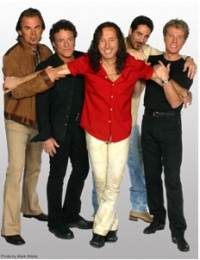
Journey is an American rock band formed in San Francisco, California in 1973.
The band has gone through several phases since its inception by former members of Santana. The band's greatest commercial success came in the late 1970s through the early 1980s with a series of power ballads and songs such as "Don't Stop Believing", "Any Way You Want It", "Faithfully", "Open Arms", "Separate Ways", and "Wheel in the Sky."
Journey has been eligible for induction into the Rock & Roll Hall of Fame since 2000, but Gregg Rolie is currently the only member of Journey who has been inducted—as a member of parent band Santana. In 2009, Steve Perry, the band's best-known lead vocalist, will be eligible for induction as a solo artist.
Current members:
Neal Schon - Lead & rhythm guitars, backing vocals, lead vocals (1973-present)
Ross Valory - Bass, backing vocals, lead vocals (1973-1985, 1995-present)
Jonathan Cain - Piano, keyboards, harmonica, rhythm guitar, backing vocals, lead vocals (1980-present)
Deen Castronovo - Drums, percussion, backing vocals, lead vocals (1998-present)
Arnel Pineda - Lead vocals (2007-present)
The band has gone through several phases since its inception by former members of Santana. The band's greatest commercial success came in the late 1970s through the early 1980s with a series of power ballads and songs such as "Don't Stop Believing", "Any Way You Want It", "Faithfully", "Open Arms", "Separate Ways", and "Wheel in the Sky."
Journey has been eligible for induction into the Rock & Roll Hall of Fame since 2000, but Gregg Rolie is currently the only member of Journey who has been inducted—as a member of parent band Santana. In 2009, Steve Perry, the band's best-known lead vocalist, will be eligible for induction as a solo artist.
Current members:
Neal Schon - Lead & rhythm guitars, backing vocals, lead vocals (1973-present)
Ross Valory - Bass, backing vocals, lead vocals (1973-1985, 1995-present)
Jonathan Cain - Piano, keyboards, harmonica, rhythm guitar, backing vocals, lead vocals (1980-present)
Deen Castronovo - Drums, percussion, backing vocals, lead vocals (1998-present)
Arnel Pineda - Lead vocals (2007-present)
pat metheny

Patrick Bruce "Pat" Metheny (/məˈθiːni/ mə-thee-nee; born August 12, 1954) is an American jazz guitarist and composer.
He is the leader of the Pat Metheny Group and is also involved in duets, solo works and other side projects. His style incorporates elements of progressive and contemporary jazz, post-bop, latin jazz and jazz fusion. Pat Metheny has three gold albums and 20 Grammy Awards. He is the brother of jazz flugelhornist and journalist Mike Metheny.
He is the leader of the Pat Metheny Group and is also involved in duets, solo works and other side projects. His style incorporates elements of progressive and contemporary jazz, post-bop, latin jazz and jazz fusion. Pat Metheny has three gold albums and 20 Grammy Awards. He is the brother of jazz flugelhornist and journalist Mike Metheny.
tomasso albinoni
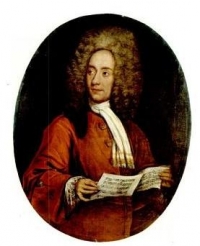
Tomaso Giovanni Albinoni (8 June 1671 – 17 January 1751) was an Italian Baroque composer. His output includes operas, concertos, sonatas for one to six instruments, sinfonias, and solo cantatas. While famous in his day as an opera composer, he is known today for his instrumental music, especially his concertos. He is also remembered today for a work called "Adagio in G minor", attributed to him but said to be written by Remo Giazotto, a modern musicologist and composer, who was a cataloger of the works of Albinoni.
Duman
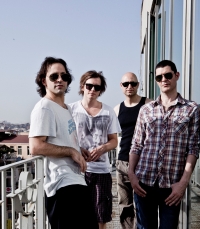
Duman (English: Smoke) is a Turkish rock band. Founded in 1999, the band features Kaan Tangöze on vocals and guitar, Ari Barokas on bass guitar and backing vocals, Batuhan Mutlugil on lead guitar and backing vocals and Cengiz Baysal on drums. Cengiz Baysal left the group in November 2016, and the new drummer is Mehmet Demirdelen. The band's music combines elements of traditional Turkish folk music with modern rock and grunge.They composed a song titled "Eyvallah" following May 2013 Taksim Gezi Park protests which they published on YouTube. Duman - Eyvallah.
Herbie Hancock

Herbert Jeffrey "Herbie" Hancock (born April 12, 1940) is an American pianist and composer. He is regarded not only as one of the greatest living jazz musicians, but also as one of the most influential jazz musicians of the 20th century. His music embraces elements of funk and soul while adopting freer stylistic elements from jazz. In his jazz improvisation, he possesses a unique creative blend of jazz, blues, and modern classical music, with harmonic stylings much like the styles of Claude Debussy and Maurice Ravel.
As part of Miles Davis's "second great quintet," Hancock helped redefine the role of a jazz rhythm section, and was one of the primary architects of the "post-bop" sound. Later, he was one of the first jazz musicians to embrace synthesizers and funk. Hancock's music is often melodic and accessible; he has had many songs "cross over" and achieved success among pop audiences.
Herbie's best-known solo works include "Cantaloupe Island," "Watermelon Man" (later performed by dozens of musicians, including bandleader Mongo Santamaria), "Maiden Voyage," "Chameleon," and the singles " I Thought It Was You" and "Rockit." His 2007 tribute album "River: The Joni Letters" won the 2007 Grammy Award for Album of the Year, only the second jazz album ever to win the award after 1965's Getz/Gilberto.
He is an adherent of the Nichiren school of Mahayana Buddhism.
As part of Miles Davis's "second great quintet," Hancock helped redefine the role of a jazz rhythm section, and was one of the primary architects of the "post-bop" sound. Later, he was one of the first jazz musicians to embrace synthesizers and funk. Hancock's music is often melodic and accessible; he has had many songs "cross over" and achieved success among pop audiences.
Herbie's best-known solo works include "Cantaloupe Island," "Watermelon Man" (later performed by dozens of musicians, including bandleader Mongo Santamaria), "Maiden Voyage," "Chameleon," and the singles " I Thought It Was You" and "Rockit." His 2007 tribute album "River: The Joni Letters" won the 2007 Grammy Award for Album of the Year, only the second jazz album ever to win the award after 1965's Getz/Gilberto.
He is an adherent of the Nichiren school of Mahayana Buddhism.
Mozart

Wolfgang Amadeus Mozart, full name Johann Chrysostom Wolfgang Amadeus Mozart (27 January 1756 â 5 December 1791) was a prolific and influential composer of the Classical era. His over 600 compositions include works widely acknowledged as pinnacles of symphonic, concertante, chamber, piano, operatic, and choral music. Mozart is among the most enduringly popular of classical composers, and many of his works are part of the standard concert repertoire.
Mozart's music, like Haydn's, stands as an archetypal example of the Classical style. His works spanned the period during which that style transformed from one exemplified by the style galant to one that began to incorporate some of the contrapuntal complexities of the late Baroque, complexities against which the galant style had been a reaction. Mozart's own stylistic development closely paralleled the development of the classical style as a whole. In addition, he was a versatile composer and wrote in almost every major genre, including symphony, opera, the solo concerto, chamber music including string quartet and string quintet, and the piano sonata. While none of these genres were new, the piano concerto was almost single-handedly developed and popularized by Mozart. He also wrote a great deal of religious music, including masses; and he composed many dances, divertimenti, serenades, and other forms of light entertainment.
The central traits of the classical style can be identified in Mozart's music. Clarity, balance, and transparency are hallmarks of his work.
Mozart's music, like Haydn's, stands as an archetypal example of the Classical style. His works spanned the period during which that style transformed from one exemplified by the style galant to one that began to incorporate some of the contrapuntal complexities of the late Baroque, complexities against which the galant style had been a reaction. Mozart's own stylistic development closely paralleled the development of the classical style as a whole. In addition, he was a versatile composer and wrote in almost every major genre, including symphony, opera, the solo concerto, chamber music including string quartet and string quintet, and the piano sonata. While none of these genres were new, the piano concerto was almost single-handedly developed and popularized by Mozart. He also wrote a great deal of religious music, including masses; and he composed many dances, divertimenti, serenades, and other forms of light entertainment.
The central traits of the classical style can be identified in Mozart's music. Clarity, balance, and transparency are hallmarks of his work.
tony williams
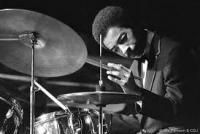
Anthony Tillmon Williams (December 12, 1945 – February 23, 1997) was an American jazz drummer.Williams first gained fame in the band of trumpeter Miles Davis and pioneered jazz fusion. He was inducted into the Modern Drummer Hall of Fame in 1986. He studied with drummer Alan Dawson at an early age, and began playing professionally at the age of 13 with saxophonist Sam Rivers. Saxophonist Jackie McLean hired Williams when he was 16.
Duke Ellington

Edward Kennedy "Duke" Ellington (April 29, 1899 â May 24, 1974) was an American composer, pianist, and bandleader.
Recognized during his life as one of the most influential figures in jazz, if not in all American music, Ellington's reputation has increased since his death, including a special award citation from the Pulitzer Prize Board.
Ellington called his style and sound "American Music" rather than jazz, and liked to describe those who impressed him as "beyond category", including many of the musicians who served with his orchestra, some of whom were themselves considered among the giants of jazz and remained with Ellington's orchestra for decades. While many were noteworthy in their own right, it was Ellington that melded them into one of the most well-known orchestral units in the history of jazz. He often composed specifically for the style and skills of these individuals, such as "Jeep's Blues" for Johnny Hodges, "Concerto for Cootie" ("Do Nothing Till You Hear from Me") for Cootie Williams and "The Mooche" for Tricky Sam Nanton. He also recorded songs written by his bandsmen, such as Juan Tizol's "Caravan" and "Perdido" which brought the "Spanish Tinge" to big-band jazz. After 1941, he frequently collaborated with composer-arranger Billy Strayhorn, who he called his alter-ego.
One of the twentieth century's best-known African-American celebrities, Ellington recorded for many American record companies, and appeared in several films. Ellington and his orchestra toured the United States and Europe regularly before and after World War II. Ellington led his band from 1923 until his death in 1974. His son Mercer Ellington took over the band until his death from cancer in 1996. Paul Ellington, Mercer's youngest son, took over the Orchestra from there and after his mother's passing took over the Estate of Duke and Mercer Ellington.
Recognized during his life as one of the most influential figures in jazz, if not in all American music, Ellington's reputation has increased since his death, including a special award citation from the Pulitzer Prize Board.
Ellington called his style and sound "American Music" rather than jazz, and liked to describe those who impressed him as "beyond category", including many of the musicians who served with his orchestra, some of whom were themselves considered among the giants of jazz and remained with Ellington's orchestra for decades. While many were noteworthy in their own right, it was Ellington that melded them into one of the most well-known orchestral units in the history of jazz. He often composed specifically for the style and skills of these individuals, such as "Jeep's Blues" for Johnny Hodges, "Concerto for Cootie" ("Do Nothing Till You Hear from Me") for Cootie Williams and "The Mooche" for Tricky Sam Nanton. He also recorded songs written by his bandsmen, such as Juan Tizol's "Caravan" and "Perdido" which brought the "Spanish Tinge" to big-band jazz. After 1941, he frequently collaborated with composer-arranger Billy Strayhorn, who he called his alter-ego.
One of the twentieth century's best-known African-American celebrities, Ellington recorded for many American record companies, and appeared in several films. Ellington and his orchestra toured the United States and Europe regularly before and after World War II. Ellington led his band from 1923 until his death in 1974. His son Mercer Ellington took over the band until his death from cancer in 1996. Paul Ellington, Mercer's youngest son, took over the Orchestra from there and after his mother's passing took over the Estate of Duke and Mercer Ellington.
Wizet

Wizet is a game development studio located in Seoul, South Korea, and is popular for its hit game, MapleStory. Wizet developed a franchise system and expanded its services to Japan, China, Thailand, Malaysia, Singapore, Taiwan, the USA, Europe, and Brazil. Eventually, Wizet reached the global world after having finished developing key features of MapleStory.
Buddy Rich
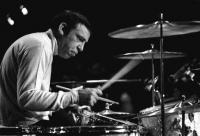
Bernard "Buddy" Rich (September 30, 1917 – April 2, 1987) was an American jazz drummer and bandleader. Rich was billed as "the world's greatest drummer" and was known for his virtuosic technique, power, groove, and speed.
Rich's technique has been one of the most standardized and coveted in drumming. His dexterity, speed and smooth execution are considered "holy grails" of drum technique. While Rich typically held his sticks using traditional grip, he was also a skilled "match grip" player, and was one of few drummers to master the one-handed roll on both hands. Some of his more spectacular moves are crossover riffs, where he would criss-cross his arms from one drum to another, sometimes over the arm, and even under the arm at great speed.
He often used contrasting techniques to keep long drum solos from getting mundane. Aside from his energetic explosive displays, he would go into quieter passages. One passage he would use in most solos starts with a simple single-stroke roll on the snare picking up speed and power, then slowly moving his sticks closer to the rim as he gets quieter and then eventually playing on just the rim itself while still maintaining speed. Then he would reverse the effect and slowly move towards the center of the snare while increasing power.
Rich's technique has been one of the most standardized and coveted in drumming. His dexterity, speed and smooth execution are considered "holy grails" of drum technique. While Rich typically held his sticks using traditional grip, he was also a skilled "match grip" player, and was one of few drummers to master the one-handed roll on both hands. Some of his more spectacular moves are crossover riffs, where he would criss-cross his arms from one drum to another, sometimes over the arm, and even under the arm at great speed.
He often used contrasting techniques to keep long drum solos from getting mundane. Aside from his energetic explosive displays, he would go into quieter passages. One passage he would use in most solos starts with a simple single-stroke roll on the snare picking up speed and power, then slowly moving his sticks closer to the rim as he gets quieter and then eventually playing on just the rim itself while still maintaining speed. Then he would reverse the effect and slowly move towards the center of the snare while increasing power.
Yellowjackets
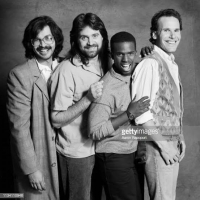
Yellowjackets is an American jazz fusion bandJimmy Haslip, Bob Mintzer, Russell Ferrante,Will Kennedy
Bill Evans

William John Evans, known as Bill Evans (August 16, 1929 – September 15, 1980) was an American jazz pianist. His use of impressionist harmony, inventive interpretation of traditional jazz repertoire, and trademark rhythmically independent, "singing" melodic lines influenced a generation of pianists, including Chick Corea, Herbie Hancock, John Taylor, Steve Kuhn, Don Friedman, Denny Zeitlin, Bobo Stenson and Keith Jarrett, as well as guitarists Lenny Breau and Pat Metheny. The music of Bill Evans continues to inspire younger pianists like Marcin Wasilewski, Fred Hersch, Ray Reach, Bill Charlap, Lyle Mays, Eliane Elias and arguably Brad Mehldau, early in his career.
Evans is an inductee of the Down Beat Jazz Hall of Fame.
Evans is an inductee of the Down Beat Jazz Hall of Fame.
Gerry Mulligan
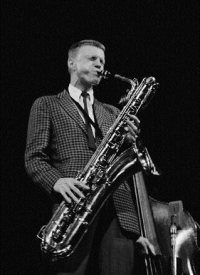
Gerald Joseph Mulligan was an American jazz saxophonist, clarinetist, composer and arranger. Though Mulligan is primarily known as one of the leading jazz baritone saxophonists – playing the instrument ..
Chucho Valdés
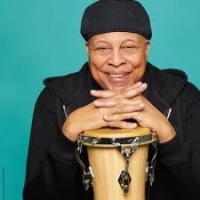
Jesús Valdés Rodríguez, better known as Chucho Valdés (born October 9, 1941), is a Cuban pianist, bandleader, composer and arranger whose career spans over 50 years. An original member of the Orquesta Cubana de Música Moderna, in 1973 he founded the group Irakere, one of Cuba's best-known Latin jazz bands. Both his father, Bebo Valdés, and his son, Chuchito, are pianists as well. As a solo artist, he has won four Grammy Awards and three Latin Grammy Awards.
Joshua Breakstone
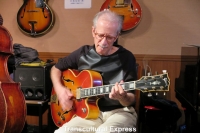
Breakstone came into contact with the music business early in life through his parents and siblings. His sister was a lighting technician at the Fillmore East theater, where he saw musicians such as Jimi Hendrix and Frank Zappa. Later, he became interested in jazz and was influenced by Charlie Parker and Lee Morgan. He studied with guitarist Sal Salvador in Manhattan. In 1972, he enrolled at the New College of the University of South Florida and graduated three years later. He continued studies at Berklee College of Music.
Richard Rodgers

Richard Charles Rodgers (June 28, 1902 – December 30, 1979) was an American composer of music for more than 900 songs and for 43 Broadway musicals. He also composed music for films and television. He is best known for his songwriting partnerships with the lyricists Lorenz Hart and Oscar Hammerstein II. His compositions have had a significant impact on popular music down to the present day, and have an enduring broad appeal.
Rodgers is one of only two persons to have won an Oscar, a Grammy, an Emmy, a Tony Award, and a Pulitzer Prize (Marvin Hamlisch is the other).
Rodgers is one of only two persons to have won an Oscar, a Grammy, an Emmy, a Tony Award, and a Pulitzer Prize (Marvin Hamlisch is the other).
The Phil Collins Big Band
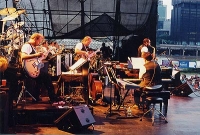
The Phil Collins Big Band was a side project of English rock drummer, singer and musician Phil Collins, which performed in 1996 and 1998.
Although best known for his work in pop as a solo artist and progressive rock with Genesis, one of Collins' earliest influences had been the American big band drummer Buddy Rich. The group presented big band renditions of Collins and Genesis songs, including hits such as "Sussudio" and "Invisible Touch". The group was primarily an instrumental act, with Collins remaining behind the drums, like the early days of Genesis and rarely singing at performances. The group split up in 1999, when Phil Collins started to work on the music for the then upcoming movie, Tarzan.
The group released one album, A Hot Night in Paris, recorded in 1998 and released in 1999. The footage of Montreux Jazz Festival 1996 was featured as a bonus feature on the 2010 DVD "Phil Collins Live At Montreux".
Collins' work with the Phil Collins Big Band received acclaim and Modern Drummer readers voted him Big Band drummer of the year in 2000.
Although best known for his work in pop as a solo artist and progressive rock with Genesis, one of Collins' earliest influences had been the American big band drummer Buddy Rich. The group presented big band renditions of Collins and Genesis songs, including hits such as "Sussudio" and "Invisible Touch". The group was primarily an instrumental act, with Collins remaining behind the drums, like the early days of Genesis and rarely singing at performances. The group split up in 1999, when Phil Collins started to work on the music for the then upcoming movie, Tarzan.
The group released one album, A Hot Night in Paris, recorded in 1998 and released in 1999. The footage of Montreux Jazz Festival 1996 was featured as a bonus feature on the 2010 DVD "Phil Collins Live At Montreux".
Collins' work with the Phil Collins Big Band received acclaim and Modern Drummer readers voted him Big Band drummer of the year in 2000.
Moloko
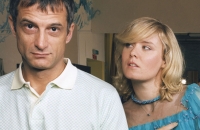
Moloko /məˈloʊkoʊ/ were an Irish-English electronic music duo formed in Sheffield, England, consisting of vocalist Róisín Murphy and producer Mark Brydon. Blending elements of trip hop, electronica, and dance music, they are best known for their UK top 10 singles "The Time Is Now" (2000) and "Familiar Feeling" (2003), as well as the 1999 Boris Dlugosch remix of "Sing It Back" which became an international hit.
John Scofield
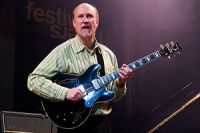
John Scofield (born December 26, 1951), sometimes referred to as "Sco", is an American jazz-rock guitarist and composer whose music includes bebop, jazz fusion, funk, blues, soul, and rock. He has worked with Miles Davis, Dave Liebman, Joe Henderson, Charles Mingus, Joey DeFrancesco, Herbie Hancock, Eddie Palmieri, Pat Metheny, Bill Frisell, Joe Lovano, Pat Martino, Mavis Staples, Phil Lesh, Billy Cobham, Medeski Martin & Wood, George Duke, Jaco Pastorius, John Mayer, Robert Glasper, and Gov't Mule.
César-Auguste-Jean-Guillaume-Hubert Franc
César-Auguste-Jean-Guillaume-Hubert Franck (10 December 1822 – 8 November 1890) was a composer, pianist, organist, and music teacher who worked in Paris during his adult life.
He was born at Liège, in what is now Belgium (though at the time of his birth it was part of the United Kingdom of the Netherlands). He gave his first concerts there in 1834 and studied privately in Paris from 1835, where his teachers included Anton Reicha. After a brief return to Belgium, and a disastrous reception for an early oratorio Ruth, he moved to Paris, where he married and embarked on a career as teacher and organist. He gained a reputation as a formidable musical improviser, and travelled widely within France to demonstrate new instruments built by Aristide Cavaillé-Coll.
In 1858, he became organist at the Basilica of St. Clotilde, Paris, a position he retained for the rest of his life. He became professor at the Paris Conservatoire in 1872; he took French nationality, a requirement of the appointment. His pupils included Vincent d'Indy, Ernest Chausson, Louis Vierne, Charles Tournemire, Guillaume Lekeu and Henri Duparc. After acquiring the professorship, Franck wrote several pieces that have entered the standard classical repertoire, including symphonic, chamber, and keyboard works.
He was born at Liège, in what is now Belgium (though at the time of his birth it was part of the United Kingdom of the Netherlands). He gave his first concerts there in 1834 and studied privately in Paris from 1835, where his teachers included Anton Reicha. After a brief return to Belgium, and a disastrous reception for an early oratorio Ruth, he moved to Paris, where he married and embarked on a career as teacher and organist. He gained a reputation as a formidable musical improviser, and travelled widely within France to demonstrate new instruments built by Aristide Cavaillé-Coll.
In 1858, he became organist at the Basilica of St. Clotilde, Paris, a position he retained for the rest of his life. He became professor at the Paris Conservatoire in 1872; he took French nationality, a requirement of the appointment. His pupils included Vincent d'Indy, Ernest Chausson, Louis Vierne, Charles Tournemire, Guillaume Lekeu and Henri Duparc. After acquiring the professorship, Franck wrote several pieces that have entered the standard classical repertoire, including symphonic, chamber, and keyboard works.
Vivaldi

Antonio Lucio Vivaldi (March 4, 1678 â July 28, 1741), nicknamed il Prete Rosso ("The Red Priest"), was a Venetian priest and Baroque music composer, as well as a famous virtuoso violinist; he was born and raised in the Republic of Venice. The Four Seasons, a series of four violin concerti, is his best-known work and a highly popular Baroque piece.
Many of Vivaldi's compositions reflect a flamboyant, almost playful, exuberance. Most of Vivaldi's repertoire was rediscovered only in the first half of the 20th century in Turin and Genoa and was published in the second half. Vivaldi's music is innovative, breaking a consolidated tradition in schemes; he gave brightness to the formal and the rhythmic structure of the concerto, repeatedly looking for harmonic contrasts and innovative melodies and themes. Moreover, Vivaldi was able to compose nonacademic music, particularly meant to be appreciated by the wide public and not only by an intellectual minority. The joyful appearance of his music reveals in this regard a transmissible joy of composing; these are among the causes of the vast popularity of his music. This popularity soon made him famous in other countries such as France which was, at the time, very independent concerning its musical taste.
Vivaldi is considered one of the composers who brought Baroque music (with its typical contrast among heavy sonorities) to evolve into a classical style. Johann Sebastian Bach was deeply influenced by Vivaldi's concertos and arias (recalled in his Johannes Passion, Matthäuspassion, and cantatas). Bach transcribed a number of Vivaldi's concerti for solo keyboard, along with a number for orchestra, including the famous Concerto for Four Violins and Violoncello, Strings and Continuo (RV 580).
Many of Vivaldi's compositions reflect a flamboyant, almost playful, exuberance. Most of Vivaldi's repertoire was rediscovered only in the first half of the 20th century in Turin and Genoa and was published in the second half. Vivaldi's music is innovative, breaking a consolidated tradition in schemes; he gave brightness to the formal and the rhythmic structure of the concerto, repeatedly looking for harmonic contrasts and innovative melodies and themes. Moreover, Vivaldi was able to compose nonacademic music, particularly meant to be appreciated by the wide public and not only by an intellectual minority. The joyful appearance of his music reveals in this regard a transmissible joy of composing; these are among the causes of the vast popularity of his music. This popularity soon made him famous in other countries such as France which was, at the time, very independent concerning its musical taste.
Vivaldi is considered one of the composers who brought Baroque music (with its typical contrast among heavy sonorities) to evolve into a classical style. Johann Sebastian Bach was deeply influenced by Vivaldi's concertos and arias (recalled in his Johannes Passion, Matthäuspassion, and cantatas). Bach transcribed a number of Vivaldi's concerti for solo keyboard, along with a number for orchestra, including the famous Concerto for Four Violins and Violoncello, Strings and Continuo (RV 580).
Bill Withers
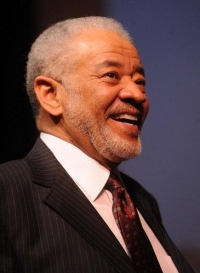
Bill Withers (born July 4, 1938 in Slab Fork, West Virginia) is an American singer-songwriter who performed and recorded from the late 1960s until the mid 1980s. Some of his best-known songs are "Ain't No Sunshine," "Use Me," "Lovely Day," "Lean on Me", "Grandma's Hands" and "Just the Two of Us".
Marvin Gaye
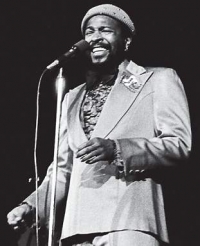
Marvin Pentz Gay, Jr., better known as Marvin Gaye (April 2, 1939 - April 1, 1984) was an American singer-songwriter, drummer, pianist and instrumentalist. Starting his career as a member of the successful doo-wop group The Moonglows in the late fifties, he ventured into a solo career shortly after the group disbanded in 1960 signing with the Tamla subsidiary of Motown Records. After a year as a session drummer, Marvin quickly ranked as the label's top-selling solo artist during the sixties. Due to numerous solo hits including "How Sweet It Is (To Be Loved By You)", "Ain't That Peculiar", "I Heard It Through the Grapevine" and his duet singles with singers such as Mary Wells and Tammi Terrell, he was crowned "The Prince of Motown"and "The Prince of Soul".
Notable for fighting the hit-making, but creatively restrictive, Motown record-making process, in which performers and songwriters and record producers were generally kept in separate camps, Marvin was able to prove with albums like his groundbreaking 1971 album, What's Going On and his 1973 album, Let's Get It On, that he was able to produce his own form of musical expression without relying on the Motown system inspiring fellow Motown artists such as Stevie Wonder nd Michael Jackson to do the same.
His mid-1970s work including the Let's Get It On and I Want You albums helped to influence the quiet storm, urban adult contemporary and slow jam genres. After a self-imposed European exile in the late seventies, Marvin returned to prominence briefly on the 1982 Grammy-winning hit, "Sexual Healing" and the Midnight Love album before his tragic death at the hands of his clergyman father on April 1, 1984. He was posthumously inducted to the Rock and Roll Hall of Fame in 1987.
Notable for fighting the hit-making, but creatively restrictive, Motown record-making process, in which performers and songwriters and record producers were generally kept in separate camps, Marvin was able to prove with albums like his groundbreaking 1971 album, What's Going On and his 1973 album, Let's Get It On, that he was able to produce his own form of musical expression without relying on the Motown system inspiring fellow Motown artists such as Stevie Wonder nd Michael Jackson to do the same.
His mid-1970s work including the Let's Get It On and I Want You albums helped to influence the quiet storm, urban adult contemporary and slow jam genres. After a self-imposed European exile in the late seventies, Marvin returned to prominence briefly on the 1982 Grammy-winning hit, "Sexual Healing" and the Midnight Love album before his tragic death at the hands of his clergyman father on April 1, 1984. He was posthumously inducted to the Rock and Roll Hall of Fame in 1987.
Beatles

The Beatles were an English rock band formed in Liverpool in 1960. Their best-known lineup, consisting of John Lennon, Paul McCartney, George Harrison, and Ringo Starr, became the greatest and most influential act of the rock era, introducing more innovations into popular music than any other rock band of the 20th century. Rooted in skiffle and 1950s rock and roll, the Beatles later utilized several genres, ranging from pop ballads to psychedelic rock, often incorporating classical elements in innovative ways. In the early 1960s, their enormous popularity first emerged as "Beatlemania", but as their songwriting grew in sophistication, they came to be perceived by many fans and cultural observers as an embodiment of the ideals shared by the era's sociocultural revolutions.
The band built their reputation playing clubs in Liverpool and Hamburg over a three-year period from 1960. Manager Brian Epstein moulded them into a professional act and producer George Martin enhanced their musical potential. They gained popularity in the United Kingdom after their first modest hit, "Love Me Do", in late 1962. They acquired the nickname the "Fab Four" as Beatlemania grew in Britain over the following year, and by early 1964 they had become international stars, leading the "British Invasion" of the United States pop market. From 1965 on, the Beatles produced what many critics consider their finest material, including the innovative and widely influential albums Rubber Soul (1965), Revolver (1966), Sgt Pepper's Lonely Hearts Club Band (1967), The Beatles (1968), and Abbey Road (1969). After their break-up in 1970, they each enjoyed successful musical careers. Lennon was shot and killed in December 1980, and Harrison died of lung cancer in November 2001. McCartney and Starr remain musically active.
The band built their reputation playing clubs in Liverpool and Hamburg over a three-year period from 1960. Manager Brian Epstein moulded them into a professional act and producer George Martin enhanced their musical potential. They gained popularity in the United Kingdom after their first modest hit, "Love Me Do", in late 1962. They acquired the nickname the "Fab Four" as Beatlemania grew in Britain over the following year, and by early 1964 they had become international stars, leading the "British Invasion" of the United States pop market. From 1965 on, the Beatles produced what many critics consider their finest material, including the innovative and widely influential albums Rubber Soul (1965), Revolver (1966), Sgt Pepper's Lonely Hearts Club Band (1967), The Beatles (1968), and Abbey Road (1969). After their break-up in 1970, they each enjoyed successful musical careers. Lennon was shot and killed in December 1980, and Harrison died of lung cancer in November 2001. McCartney and Starr remain musically active.
Tchaikovsky

Pyotr Il'yich Tchaikovsky (May 7 1840 â November 6 1893) was a Russian composer of the Romantic era. While not part of the nationalistic music group known as "The Five", Tchaikovsky wrote music which, in the opinion of Harold Schonberg, was distinctly Russian: plangent, introspective, with modally-inflected melody and harmony.
Aesthetically, Tchaikovsky remained open to all aspects of Saint Petersburg musical life. He was impressed by Serov and Balakirev as well as the classical values upheld by the conservatory. Both the progressive and conservative camps in Russian music at the time attempted to win him over. Tchaikovsky charted his compositional course between these two factions, retaining his individuality as a composer as well as his Russian identity. In this he was influenced by the ideals of his teacher Nikolai Rubinstein and Nikolai's brother Anton.
Tchaikovsky's musical cosmopolitanism led him to be favored by many Russian music-lovers over the "Russian" harmonies and styles of Mussorgsky, Borodin and Rimsky-Korsakov.
Nonetheless he frequently adapted Russian traditional melodies and dance forms in his music, which enhanced his success in his home country. The success in St. Petersburg at the premiere of his Third Orchestral Suite may have been due in large part to his concluding the work with a polonaise. He also used a polonaise for the final movement of his Third Symphony.
Aesthetically, Tchaikovsky remained open to all aspects of Saint Petersburg musical life. He was impressed by Serov and Balakirev as well as the classical values upheld by the conservatory. Both the progressive and conservative camps in Russian music at the time attempted to win him over. Tchaikovsky charted his compositional course between these two factions, retaining his individuality as a composer as well as his Russian identity. In this he was influenced by the ideals of his teacher Nikolai Rubinstein and Nikolai's brother Anton.
Tchaikovsky's musical cosmopolitanism led him to be favored by many Russian music-lovers over the "Russian" harmonies and styles of Mussorgsky, Borodin and Rimsky-Korsakov.
Nonetheless he frequently adapted Russian traditional melodies and dance forms in his music, which enhanced his success in his home country. The success in St. Petersburg at the premiere of his Third Orchestral Suite may have been due in large part to his concluding the work with a polonaise. He also used a polonaise for the final movement of his Third Symphony.
The Carpenters
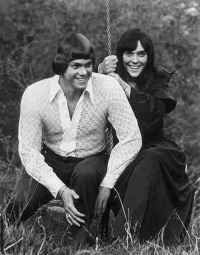
The Carpenters were a vocal and instrumental duo, consisting of siblings Karen and Richard Carpenter. Though often referred to by the public as "The Carpenters", the duo's official name on authorized recordings and press materials is simply "Carpenters", without the definite article. During a period in the 1970s when louder and wilder rock was in great demand, Richard and Karen produced a distinctively soft musical style that made them one of the best-selling music artists of all time.
The Carpenters' melodic pop charted a record-breaking score of hit recordings on the American Top 40 and Adult Contemporary charts, becoming leading sellers in the soft rock, easy listening and adult contemporary genres. The Carpenters had three #1 singles on the Billboard Hot 100 and fifteen #1 hits on the Adult Contemporary Chart (see The Carpenters discography). In addition, they had twelve top 10 singles (including their #1 hits). To date, The Carpenters' album and single sales total more than 100 million units.
During their fourteen-year career, The Carpenters recorded eleven albums, five of which contained top 10 singles (Close to You, Carpenters, A Song for You, Now & Then and Horizon), thirty-one singles, five television specials, and one short-lived television series. They toured in the United States, the United Kingdom, Japan, Australia, the Netherlands and Belgium. Their recording career ended with Karen's death on February 4, 1983. Karen passed away due to a cardiac arrest due to complications of anorexia nervosa. Extensive news coverage of the circumstances surrounding her death increased public awareness of the consequences of eating disorders.
The Carpenters' melodic pop charted a record-breaking score of hit recordings on the American Top 40 and Adult Contemporary charts, becoming leading sellers in the soft rock, easy listening and adult contemporary genres. The Carpenters had three #1 singles on the Billboard Hot 100 and fifteen #1 hits on the Adult Contemporary Chart (see The Carpenters discography). In addition, they had twelve top 10 singles (including their #1 hits). To date, The Carpenters' album and single sales total more than 100 million units.
During their fourteen-year career, The Carpenters recorded eleven albums, five of which contained top 10 singles (Close to You, Carpenters, A Song for You, Now & Then and Horizon), thirty-one singles, five television specials, and one short-lived television series. They toured in the United States, the United Kingdom, Japan, Australia, the Netherlands and Belgium. Their recording career ended with Karen's death on February 4, 1983. Karen passed away due to a cardiac arrest due to complications of anorexia nervosa. Extensive news coverage of the circumstances surrounding her death increased public awareness of the consequences of eating disorders.
Hans Zimmer

Hans Florian Zimmer (born September 12, 1957) is a German film score composer and music producer. He has composed music for over 100 films, including Hollywood blockbusters such as the Pirates of the Caribbean series, Gladiator, The Lion King, The Da Vinci Code and The Dark Knight.
Zimmer spent the early part of his career in the United Kingdom before moving to the United States. He is the head of the film music division at DreamWorks studios, and works with other composers through the company which he founded, Remote Control Productions. His work is notable for integrating electronic music sounds with traditional orchestral arrangements.
Zimmer spent the early part of his career in the United Kingdom before moving to the United States. He is the head of the film music division at DreamWorks studios, and works with other composers through the company which he founded, Remote Control Productions. His work is notable for integrating electronic music sounds with traditional orchestral arrangements.
John Coltrane

John William "Trane" Coltrane (September 23, 1926 – July 17, 1967) was an American jazz saxophonist and composer.
Working in the bebop and hard bop idioms early in his career, Coltrane helped pioneer the use of modes in jazz and later was at the forefront of free jazz. He was prolific, making about fifty recordings as a leader during his recording career, and appeared as a sideman on many other albums, notably with trumpeter Miles Davis and pianist Thelonious Monk. As his career progressed, Coltrane's music took on an increasingly spiritual dimension. His second wife was pianist Alice Coltrane, and their son Ravi Coltrane is also a saxophonist.
He influenced innumerable musicians, and remains one of the most significant tenor saxophonists in jazz history. He received many awards, among them a posthumous Special Citation from the Pulitzer Prize Board in 2007 for his "masterful improvisation, supreme musicianship and iconic centrality to the history of jazz."
Working in the bebop and hard bop idioms early in his career, Coltrane helped pioneer the use of modes in jazz and later was at the forefront of free jazz. He was prolific, making about fifty recordings as a leader during his recording career, and appeared as a sideman on many other albums, notably with trumpeter Miles Davis and pianist Thelonious Monk. As his career progressed, Coltrane's music took on an increasingly spiritual dimension. His second wife was pianist Alice Coltrane, and their son Ravi Coltrane is also a saxophonist.
He influenced innumerable musicians, and remains one of the most significant tenor saxophonists in jazz history. He received many awards, among them a posthumous Special Citation from the Pulitzer Prize Board in 2007 for his "masterful improvisation, supreme musicianship and iconic centrality to the history of jazz."
Jackson 5
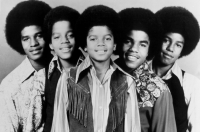
The Jackson 5 (stylized as the Jackson 5ive), later known as the Jacksons, is an American pop band composed of members of the Jackson family. The group was founded in 1965 in Gary, Indiana, by brothers Jackie, Tito, and Jermaine, with younger brothers Marlon and Michael joining soon after. The Jackson 5 performed in talent shows and clubs on the Chitlin' Circuit, then signed with Steeltown Records in 1967 and released two singles. In 1968, they left Steeltown Records and signed with Motown, where they were first group to debut with four consecutive number one hits on the Billboard Hot 100 with the songs "I Want You Back", "ABC", "The Love You Save", and "I'll Be There". They also achieved 16 top-40 singles on the chart.
Guns N' Roses
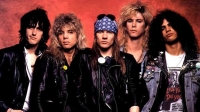
Guns N 'Roses is an American rock band founded in 1985 in Los Angeles, California. Axl Rose, Slash, Izzy Stradlin, Duff McKagan, and Steven , Genres: Hard rock, Heavy metal, Blues rock, Glam rock They started their music life in Los Angeles, California, USA (1985) Albums: Appetite for Destruction, Use Your Illusion I
John Lennon

John Winston Ono Lennon, MBE (born John Winston Lennon; October 9, 1940 – December 8, 1980) was an English rock musician, singer, songwriter, artist, and peace activist who gained worldwide fame as one of the founding members of The Beatles. As a member of the group, Lennon was one of the lead vocalists and co-wrote many of the band's songs with Paul McCartney.
In his solo career, Lennon wrote and recorded songs such as "Give Peace a Chance" and "Imagine". Lennon revealed his rebellious nature and wit on television, in films such as A Hard Day's Night, in books such as In His Own Write, and in press conferences and interviews. He was controversial through his work as a peace activist, artist, and author.
Lennon had two sons: Julian Lennon, with his first wife Cynthia Lennon, and Sean Ono Lennon, with his second wife, avant-garde artist Yoko Ono. After a self-imposed retirement from 1976 to 1980, Lennon reemerged with a comeback album, but was murdered one month later in New York City on 8 December 1980. In 2002, respondents to a BBC poll on the 100 Greatest Britons voted Lennon into eighth place. In 2004, Rolling Stone magazine ranked Lennon number 38 on its list of "The Immortals: The Fifty Greatest Artists of All Time" and ranked The Beatles at number one.
In his solo career, Lennon wrote and recorded songs such as "Give Peace a Chance" and "Imagine". Lennon revealed his rebellious nature and wit on television, in films such as A Hard Day's Night, in books such as In His Own Write, and in press conferences and interviews. He was controversial through his work as a peace activist, artist, and author.
Lennon had two sons: Julian Lennon, with his first wife Cynthia Lennon, and Sean Ono Lennon, with his second wife, avant-garde artist Yoko Ono. After a self-imposed retirement from 1976 to 1980, Lennon reemerged with a comeback album, but was murdered one month later in New York City on 8 December 1980. In 2002, respondents to a BBC poll on the 100 Greatest Britons voted Lennon into eighth place. In 2004, Rolling Stone magazine ranked Lennon number 38 on its list of "The Immortals: The Fifty Greatest Artists of All Time" and ranked The Beatles at number one.
steve vai
Steven Siro Vai (/vaɪ/; born June 6, 1960) is an American guitarist, composer, singer, songwriter, and producer. A three-time Grammy Award winner and fifteen-time nominee, Vai started his music career in 1978 at the age of eighteen as a transcriptionist for Frank Zappa, and played in Zappa's band from 1980 to 1983. He embarked on a solo career in 1983 and has released eight solo albums to date. He has recorded and toured with Alcatrazz, David Lee Roth, and Whitesnake, as well as recording with artists such as Public Image Ltd, Mary J. Blige, Spinal Tap, and Ozzy Osbourne. Additionally, Vai has toured with live-only acts G3, Zappa Plays Zappa, and the Experience Hendrix tour, as well as headlining international tours.
Chris Rea
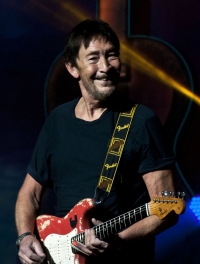
Christopher Anton Rea (/ˈriːə/ REE-ə; born 4 March 1951) is an English rock and blues singer-songwriter and guitarist. Born and raised in Middlesbrough, he is of Italian and Irish descent. He is known for his distinctive, husky singing and slide guitar playing, with the Guinness Rockopedia describing him as a "gravel-voiced guitar stalwart". After learning to play the guitar relatively late, a short burst of local band activity led to his launching a solo career in 1978.
Claude Bolling
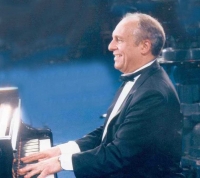
Claude Bolling (born 10 April 1930), is a renowned French jazz pianist, composer, arranger, and occasional actor.
He was born in Cannes, studied at the Nice Conservatory, then in Paris. A child prodigy, by age 14 he was playing jazz piano professionally, with Lionel Hampton, Roy Eldridge, and Kenny Clarke. Bolling's books on jazz technique show that he did not delve far beyond bebop into much avant garde jazz. He was a major part of the traditional jazz revival in the late 1960s, and he became friends with Oscar Peterson.
He has written music for over one hundred films, mostly French, starting with the score for a 1957 documentary about the Cannes Film Festival, and including the films Borsalino (1970), and California Suite (1978).
Bolling is also noted for a series of "crossover" collaborations with classical musicians. His Suite for Flute and Jazz Piano Trio with Jean-Pierre Rampal, a mix of Baroque elegance with modern swing, has been a top seller for many years, and was followed up by other works in the same vein. It was particularly popular in the United States, at the top of the hit parade for two years after its release and on billboard top 40 for 530 weeks, roughly ten years.
Following his work with Rampal, Bolling went on to work with many other musicians, from different genres, including Alexandre Lagoya, Pinchas Zukerman, Maurice André, and Yo-Yo Ma. He has also worked with, and performed tributes to many others, including Lionel Hampton, Duke Ellington, Stéphane Grappelli, Django Reinhardt, Oscar Peterson.
He was born in Cannes, studied at the Nice Conservatory, then in Paris. A child prodigy, by age 14 he was playing jazz piano professionally, with Lionel Hampton, Roy Eldridge, and Kenny Clarke. Bolling's books on jazz technique show that he did not delve far beyond bebop into much avant garde jazz. He was a major part of the traditional jazz revival in the late 1960s, and he became friends with Oscar Peterson.
He has written music for over one hundred films, mostly French, starting with the score for a 1957 documentary about the Cannes Film Festival, and including the films Borsalino (1970), and California Suite (1978).
Bolling is also noted for a series of "crossover" collaborations with classical musicians. His Suite for Flute and Jazz Piano Trio with Jean-Pierre Rampal, a mix of Baroque elegance with modern swing, has been a top seller for many years, and was followed up by other works in the same vein. It was particularly popular in the United States, at the top of the hit parade for two years after its release and on billboard top 40 for 530 weeks, roughly ten years.
Following his work with Rampal, Bolling went on to work with many other musicians, from different genres, including Alexandre Lagoya, Pinchas Zukerman, Maurice André, and Yo-Yo Ma. He has also worked with, and performed tributes to many others, including Lionel Hampton, Duke Ellington, Stéphane Grappelli, Django Reinhardt, Oscar Peterson.
Toto
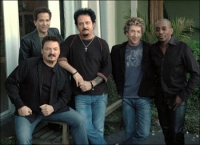
Toto was a Grammy Award winning American rock band founded in 1977 by some of the most popular and experienced session musicians of the era. The band enjoyed great commercial success in the 1980s, beginning with the band's self-titled debut, released in 1978, which immediately brought the band into the mainstream rock spectrum of the time. Continuing with 1982's critically acclaimed and commercially successful Toto IV, Toto became one of the biggest selling music groups of their era. They also composed the theme music for the film Dune. Although their popularity in the United States diminished in the 1990s and 2000s, they continued to tour to sold out arenas, clubs, and theaters internationally. Toto was known for their technical prowess in the studio, as well as a musical style that combines elements of pop, rock, soul, funk, progressive rock, hard rock, R&B, and jazz, making them appeal to a variety of musicians and non-musician listeners. The band has released 17 albums and has sold over 30 million records to date. Their 18th release Falling In Between Live, was released in August 2007. It had been recorded in March 2007 in Paris. As a result of guitarist Steve Lukather's departure from the band, Toto broke up after the last leg of their 2008 tour.
Chick Corea

Armando Anthony "Chick" Corea (born June 12, 1941) is a multiple Grammy Award-winning American jazz pianist, keyboardist, drummer, and composer.
He is known for his work during the 1970s in the genre of jazz fusion. He participated in the birth of the electric fusion movement as a member of Miles Davis' band in the 1960s, and in the 1970s formed Return to Forever.
He continued to pursue other collaborations and explore various musical styles throughout the 1980s and 1990s. He is also known for promoting Scientology.
He is known for his work during the 1970s in the genre of jazz fusion. He participated in the birth of the electric fusion movement as a member of Miles Davis' band in the 1960s, and in the 1970s formed Return to Forever.
He continued to pursue other collaborations and explore various musical styles throughout the 1980s and 1990s. He is also known for promoting Scientology.
Alan Jackson
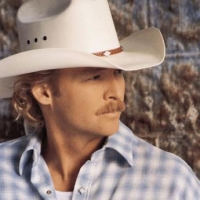
Alan Eugene Jackson (born 17 October 1958 in Newnan, Georgia) is an American country singer-songwriter who has sold over 50 million records. He was influenced by the new traditional country of the 1980s, and he was one of the most popular country singers of the 1990s, blending both honky tonk and mainstream country sounds and penning many of his own hits. His success continued into the 2000s and his music became increasingly counterposed with that of more mainstream country acts that were moving toward a more pop music sound. He is the recipient and nominee of multiple awards. He was inducted into the Georgia Music Hall of Fame in 2001.
Astor Piazzolla

Ástor Pantaleón Piazzolla (March 11, 1921 – July 4, 1992) was an Argentine tango composer and bandoneón player. His oeuvre revolutionized the traditional tango into a new style termed nuevo tango, incorporating elements from jazz and classical music. An excellent bandoneonist, he regularly performed his own compositions with different ensembles.
Piazzolla's nuevo tango was distinct from the traditional tango in its incorporation of elements of jazz, its use of extended harmonies and dissonance, its use of counterpoint, and its ventures into extended compositional forms. As Argentine psychoanalyst Carlos Kuri has pointed out, Piazzolla's fusion of tango with this wide range of other recognizable Western musical elements was so successful that it produced a new individual style transcending these influences. It is precisely this success, and individuality, that makes it hard to pin down where particular influences reside in his compositions, but some aspects are clear. The use of the passacaglia technique of a circulating bass line and harmonic sequence, invented and much used in 17th and 18th century baroque music but also central to the idea of jazz "changes", predominates in most of Piazzolla's mature compositions. Another clear reference to the baroque is the often complex and virtuosic counterpoint that sometimes follows strict fugal behavior but more often simply allows each performer in the group to assert his voice. A further technique that emphasises this sense of democracy and freedom among the musicians is improvisation that is borrowed from jazz in concept, but in practice involves a different vocabulary of scales and rhythms that stay within the parameters of the established tango sound-world. Pablo Ziegler has been particularly responsible for developing this aspect of the style both within Piazzolla's groups and since the composer's death.
Piazzolla's nuevo tango was distinct from the traditional tango in its incorporation of elements of jazz, its use of extended harmonies and dissonance, its use of counterpoint, and its ventures into extended compositional forms. As Argentine psychoanalyst Carlos Kuri has pointed out, Piazzolla's fusion of tango with this wide range of other recognizable Western musical elements was so successful that it produced a new individual style transcending these influences. It is precisely this success, and individuality, that makes it hard to pin down where particular influences reside in his compositions, but some aspects are clear. The use of the passacaglia technique of a circulating bass line and harmonic sequence, invented and much used in 17th and 18th century baroque music but also central to the idea of jazz "changes", predominates in most of Piazzolla's mature compositions. Another clear reference to the baroque is the often complex and virtuosic counterpoint that sometimes follows strict fugal behavior but more often simply allows each performer in the group to assert his voice. A further technique that emphasises this sense of democracy and freedom among the musicians is improvisation that is borrowed from jazz in concept, but in practice involves a different vocabulary of scales and rhythms that stay within the parameters of the established tango sound-world. Pablo Ziegler has been particularly responsible for developing this aspect of the style both within Piazzolla's groups and since the composer's death.
Hillsong United

The Hillsong United band is an Australian rock and worship band, a part of Hillsong Church's youth ministry Hillsong United. Their music is a contemporary style of praise and worship tempered with mainstream rock.
Current members of the Hillsong United band include Jonathon Douglass (J.D.), Jadwin "Jad" Gillies, Holly Watson, Annie Garratt, Bec Gillies, and Michelle Fragar, daughter of Russell Fragar. Michael Guy Chislett plays guitar and Matthew Tennikoff plays bass guitar. Former original drummer Luke Munns made a transition from the drums to front the rock/indie band LUKAS. Popular New Zealand artist Brooke Fraser recently joined the band when she joined the church, first appearing on United We Stand.
The annual Hillsong United CD/DVD was recorded over many years during their October youth conference Encounterfest, with the album released in the first quarter of the following year. The 2007 album All of the Above was the first album to be fully studio recorded, containing videos of songs on the DVD. The band has toured in a number of countries, leading worship to thousands in North and South America, Europe and Asia.
Current members of the Hillsong United band include Jonathon Douglass (J.D.), Jadwin "Jad" Gillies, Holly Watson, Annie Garratt, Bec Gillies, and Michelle Fragar, daughter of Russell Fragar. Michael Guy Chislett plays guitar and Matthew Tennikoff plays bass guitar. Former original drummer Luke Munns made a transition from the drums to front the rock/indie band LUKAS. Popular New Zealand artist Brooke Fraser recently joined the band when she joined the church, first appearing on United We Stand.
The annual Hillsong United CD/DVD was recorded over many years during their October youth conference Encounterfest, with the album released in the first quarter of the following year. The 2007 album All of the Above was the first album to be fully studio recorded, containing videos of songs on the DVD. The band has toured in a number of countries, leading worship to thousands in North and South America, Europe and Asia.
 Sheet Music Network is a site for those who wants to access popular sheet music easily,
letting them download the sheet music for free for trial purposes.
It's completely free to download and try the listed sheet music, but you have to delete the files after 24 hours of trial.
Don't forget, if you like the piece of music you have just learned playing,
treat the artist with respect, and go buy the original sheet music.
Sheet Music Network is a site for those who wants to access popular sheet music easily,
letting them download the sheet music for free for trial purposes.
It's completely free to download and try the listed sheet music, but you have to delete the files after 24 hours of trial.
Don't forget, if you like the piece of music you have just learned playing,
treat the artist with respect, and go buy the original sheet music.